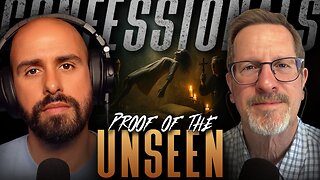Premium Only Content

Kayleigh with autism is confronted by police
Keep me motivated by donating to https://paypal.me/thisisbutter
Viewer discretion is always advised when watching this video or any others videos. I do not take any responsibility for your trauma, psychological and/or mental harm.
I do not recommend anyone to attempt, act/reproduce, and/or create hate from what you see in this video or any other videos.
Enjoy.
--------------------
What happened in 2019 when Kayleigh, an 18-year-old with autism, ended up in a Newton County jail after refusing to leave a gas station parking lot.
Sitting on a park bench months later, I asked Kayleigh, “How was jail?” Her response was simple. “It was not good.”
But knowing she doesn’t want to go to jail, doesn’t seem to stop Kayleigh’s behavior. She’s spent time in three county jails in two years for offenses related to disorderly conduct. “When I’m mad, I’m not going to be quiet. You’re not going to silence me,” Kayleigh said. The past few months, many have been moved by Kayleigh’s story as we’ve tried to explain the gaps in our behavioral and mental health system, leading some parents to abandon their children to state custody.
Kayleigh has autism, developmental disabilities and behavioral problems that make it impossible for her to live alone and be vulnerable to predators. The world’s rules on how to behave don’t come naturally, and her mom says until now, therapies that could help, have been denied by Medicaid.
As a result, Kayleigh has a tendency to run away. On the streets, she’s been the victim of sexual exploitation and rape. She has been homeless, and she has come into contact with police again and again.
According to the Department of Family and Children Services, of the children abandoned in the past five years, 42% of those that left care returned to a parent or family member. 6% were no longer tracked because they ran away. Another 3% ended up in youth detention or jail. There are no statistics to track what happens to the children with the same behavioral challenges, but their families find ways to keep them at home.
What we do know is that the Department of Juvenile Justice (DJJ) says it’s treating 60 percent of the children in its custody for some type of mental health disorder. The percentage increases to 77 percent when you look at the youths in custody for the most serious offenses.
The top diagnosis PTSD and ADHD, almost identical to the top diagnosis we found in the children abandoned to state custody.
Child welfare advocates like Susan Goico, an attorney who leads the Disability Integration Project at Atlanta Legal Aid, see it every day.“
"[They end up in] the criminal justice system. We see that a lot with the kids who are in juvenile justice because they are not getting the supports that they need,” Goico said.
When Kayleigh’s outburst started leading to arrests, she was too old for DJJ. Body camera video shows two different calls to Newton County’s 911 – with two very different outcomes. In the first incident, Kayleigh was seen pacing in a gas station parking lot. In the video, you can hear a witness ask the officer, “Is it a mental problem?” The officer responded, “I think it might be.”
The officer tried several times to talk with Kayleigh, but each time Kayleigh refused to give her name, hurling insults at times instead.
When her mom arrived, she denied the relationship and pushed her away. That’s when another officer decided the situation had gone on long enough.
As he approached to put her in handcuffs, she repeatedly yelled, “Don’t touch me.” The more he touched her, the more upset she became. The body cam clips are broken, but the time stamp indicates that within ten minutes of the officer’s arrival, Kayleigh was in handcuffs.
Kayleigh was then booked in jail, where she remained for three weeks.
The second response came a year later. Kayleigh had run away in the middle of the night, upset about the anniversary of her father’s death.“I don’t have my dad, so I don’t care if I die!” Kayleigh said, as heard in the body cam footage.
In this case, Newton County Corporal Jathan Nagrodski arrived at the scene with two other officers, all with crisis intervention training. “Most times they’re talking, they’re telling you things that will trigger them or may escalate the situation. So you have to really pick up on that" Cpl. Nagrodski said.
Triggers like the bright lights of a car or getting too close. In this case, you hear Kayleigh repeatedly tell the officers to keep their distance and not to touch her.
CIT is an intensive week-long course for police. And on this night, that training helped the officers to calm Kayleigh down, allowing her to think about her actions and finally accept her emotions.“
I don’t want to hurt nobody. I’m trying to fight my impulse to run,” she told Cpl. Nagrodski before falling to the ground in tears. De-escalation took longer, Nagrodski calmly tried to connect with Kayleigh for 22 minutes. But ultimately, it saved time.
-
 LIVE
LIVE
Dear America
1 hour agoNo More IRS!! Tariffs Bring In Over $500 BILLION! + Taylor Swift Got ENGAGED… This Is A Nightmare!!
20,363 watching -
 LIVE
LIVE
Wendy Bell Radio
5 hours agoTrump Cracks The Barrel
6,492 watching -
 LIVE
LIVE
LFA TV
3 hours agoLFA TV ALL DAY STREAM - WEDNESDAY 8/27/25
8,051 watching -
 1:22:55
1:22:55
Game On!
18 hours ago $1.62 earnedBREAKING NFL NEWS: Taylor Swift and Travis Kelce Are Engaged!
29.9K11 -
 41:04
41:04
Coin Stories with Natalie Brunell
1 day agoCooking, Culture & Crypto: Norma Chu’s Food Empire Turns Bitcoin Treasury
18.3K -
 LIVE
LIVE
JuicyJohns
56 minutes ago🟢#1 REBIRTH PLAYER 10.2+ KD🟢
36 watching -
 1:21:19
1:21:19
JULIE GREEN MINISTRIES
2 hours agoLIVE WITH JULIE
63.3K142 -
 LIVE
LIVE
GritsGG
1 hour agoWin Streaking! Most Wins 3485+ 🧠
21 watching -
 1:02:09
1:02:09
The Confessionals
21 hours agoThe Supernatural Proof You Can’t Ignore (When Angels and Demons Showed Up) | Lee Strobel
41.3K23 -
 15:24
15:24
Degenerate Jay
22 hours ago $0.76 earned5 Best Moments In Batman: Arkham Asylum
23.4K